David Porter
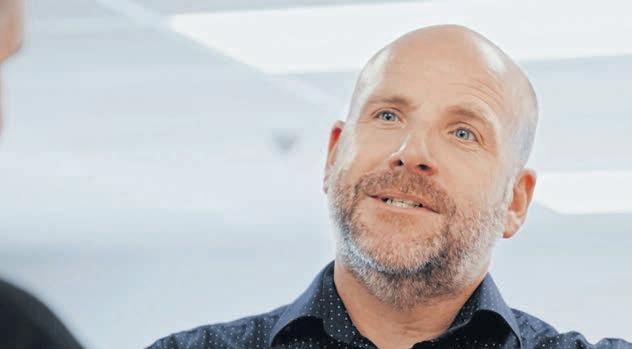
Business News speaks to Tauranga Business Chamber chair Jamie Lunam about his new role and how he sees the road ahead for the Chamber.
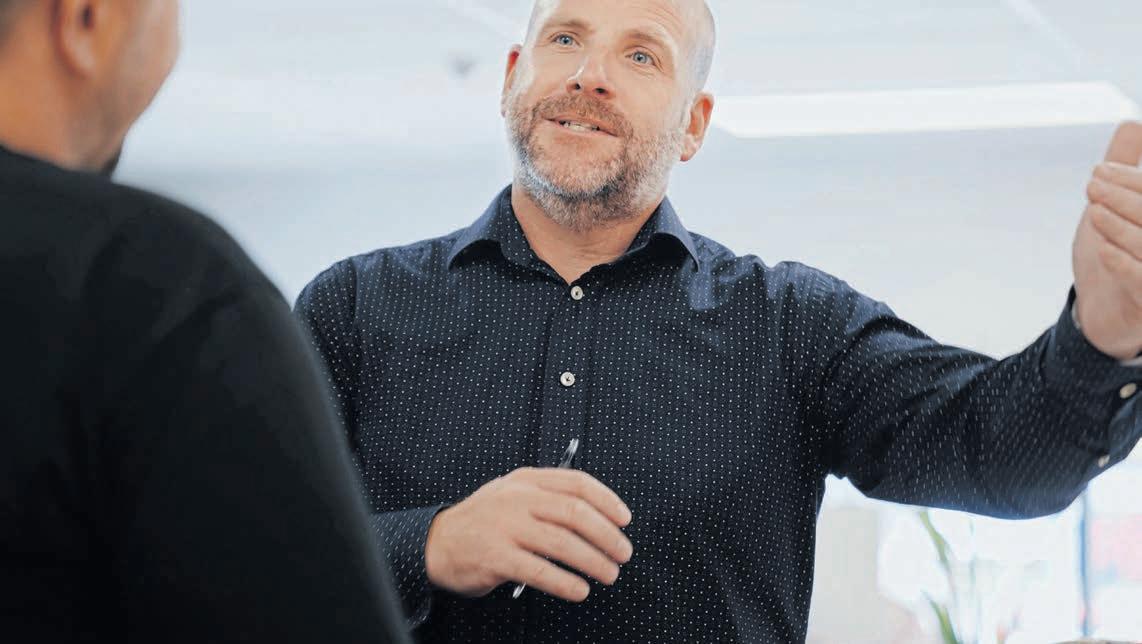
SPECIAL REPORT
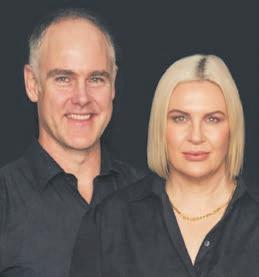


David Porter

Business News speaks to Tauranga Business Chamber chair Jamie Lunam about his new role and how he sees the road ahead for the Chamber.

SPECIAL REPORT


> By DAVID PORTER
verything in Jamie Lunam’s career came together recently when he was appointed chair of the Tauranga Business Chamber, soon after setting up his own new business.
“I’ve been wanting to be on the board for some time and really the timing was quite good,” Lunam told Bay of Plenty Business News. “I chucked my name in the hat to be on the board and ended up as chair.”
Lunam succeeded Leanne
Elder, who held the role for three years, having been a board member for three years on becoming chair. There is no fixed term for the role, but chairs have typically served between three and six years.
Lunam takes up the role soon
after successfully completing a lengthy run as leader of local business Jenkins Freshpac Systems, which included a major reorganisation. And he has recently set up his own business consultancy, James & Co. > Turntopage3












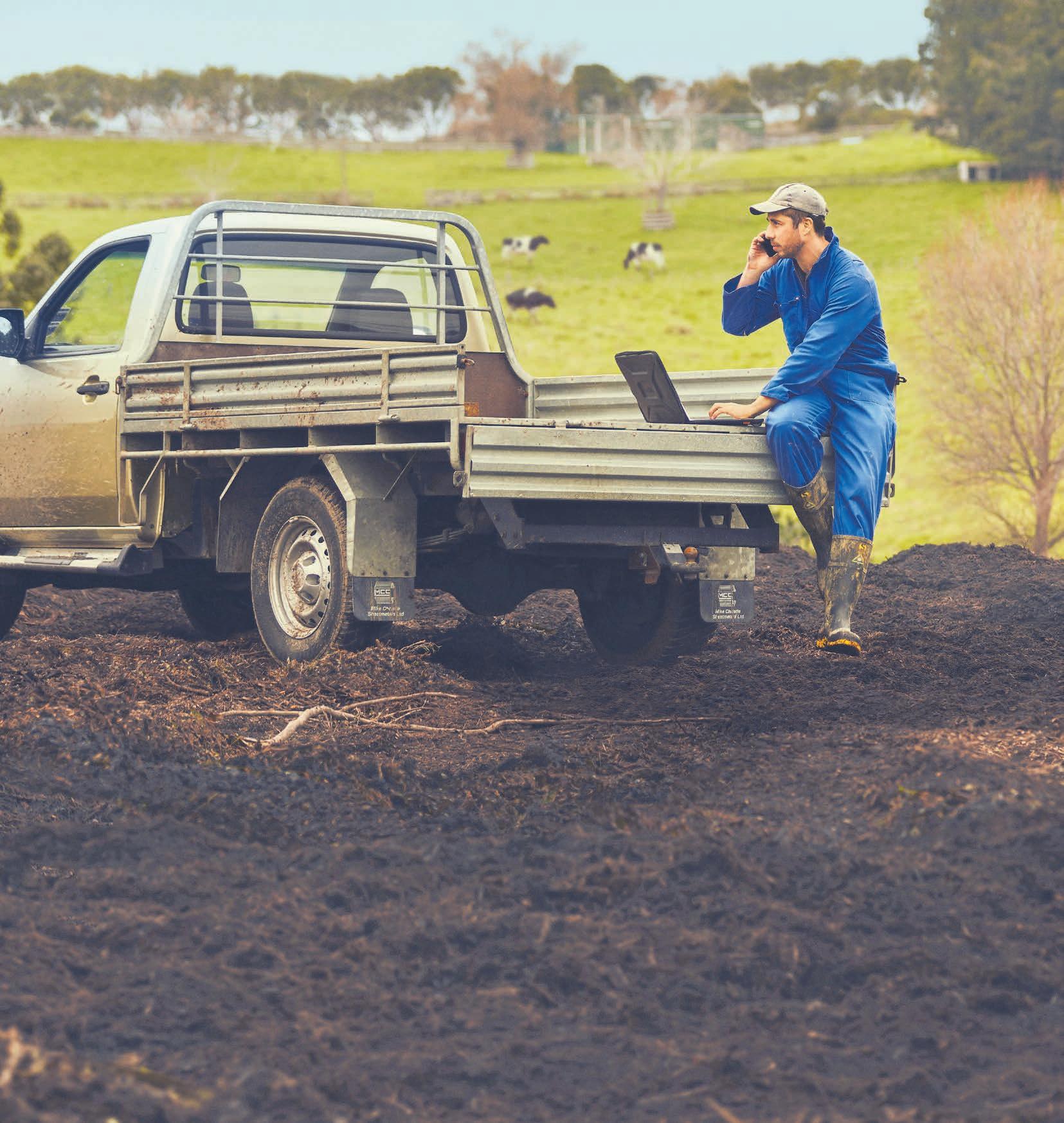



Lunam noted the Chamber had a drive to be a part of helping shape economic, and in turn, social outcomes for Tauranga’s community.
He told Bay of Plenty Business News that – especially over the past four to five years – he had seen quite a lot of transformation at the back end of the chamber.
“The new board is tasked with taking that drive to a new base, which is where it needed to be.”
Tauranga Business Chamber chief executive Matt Cowley said the make-up of the board reflected the business community, with good representation of small, medium and large businesses.
“Despite the pandemic, previous boards have overseen improvements and investment across the organisation, while keeping the finances in good order,” he told the Bay of Plenty Business News.
“The business landscape is fast-changing,” he said.
“Jamie and the new board are focused on helping businesses
overcome challenges and spotting opportunities.”
Tauranga is unusual in New Zealand in having two organisations that share many of the same objectives in supporting the business community. The two are generally seen as cooperating well. There is also a significant crossover of people involved in both organisations.
Todd Muller, who recently retired as a National Party MP for the Bay of Plenty, has assumed the role of chair of Priority One.
He told Bay of Plenty Business News: “The Chamber plays a significant role in this city and I have followed its efforts closely since I sat on the board in the late 1990s.
“As chair of Priority One I am impressed with how the two organisations can effectively advocate and provide services to their respective members without tripping over each other,” he said.
“In my view that talks to the maturity and real hands-on city-wide business experience that exists across the two organisations. I see the chamber as being great for

SME networking and core capability building of individuals and teams within business.”
Lunam said the Chamber probably would not see a lot of fundamental change at this stage as a lot of the transformation had already been done.
The Chamber had surveyed members making sure they knew what they wanted, he added.
“We’re going to build that into the strategic plan for the coming five years. It’s about knowing what you’re good at, and what you’re less good at.”
Muller said that Priority One provided leadership on the strategic challenges of the Western Bay region as a whole.
“This sees a strong focus on infrastructure, innovation, skills and global talent,” he said.
“But of course, as is the nature with our connected city, both organisations have influence in all those areas, it’s not a hard delineation of duties and nor should it be.”
Lunam noted that Chamber chief executive Cowley had grown











in his role. He said that his own aspirations included seeing Cowley continue to evolve.
“The members I believe need to see more of him, especially in that local advocacy space,” said Lunam.
“Now is the time for us to really step up that advocacy. One of the terms we keep using is ‘not just making noise, but making change’ – instead of just having an option on how can we alter the course of this.”
He noted that his own recent career at Freshpac Systems had seen him involved in situations where the writing had been on






the wall on some issues and outcomes were needed – but there was initial uncertainty about what the outcomes would be.
“Now [the Chamber] thinks it knows what is happening, it needs to be recalibrating. There’s a lot of motivation out there and confidence is building all the time.”
As to his new role at James and Co and chairing the Chamber, Lunam said: “Our strategic work [at Freshpac] had come to a conclusion, we’d gone through a lot of change and it was time for me to move on and do the things I’m best at.”
CONTACT INFORMATION
PUBLISHER
Alan Neben, Ph: 021 733 536
Email: alan@bopbusinessnews.co.nz
EDITORIAL
Alan Neben, Ph: 021 733 536
Email: editor@bopbusinessnews.co.nz
PRODUCTION – Copy/Proofs/Graphic Design
Times Media – Clare McGillivray
Email: clare@times.co.nz
ADVERTISING
Pete Wales, Mob: 022 495 9248
Email: pete@bopbusinessnews.co.nz
ELECTRONIC FORWARDING
EDITORIAL
News releases/Photos/Letters: editor@bopbusinessnews.co.nz
GENERAL ENQUIRIES
info@bopbusinessnews.co.nz
Bay of Plenty Business News has a circulation of 8000, distributed throughout Bay of Plenty between Waihi and Opotiki including Rotorua and Taupo, and to a subscription base.
Bay of Plenty Business Publications 309/424 Maunganui Rd, Mt Maunganui, 3116
Bay of Plenty Business Publications specialises in business publishing, advertising, design, print and electronic media services.
In case you missed last month’s


‘How
> By DAVID PORTER
ntrepreneurial Texasbased space company
Intuitive Machines is basking in the glory of having created and managed the first American lunar module since 1972 to land on the moon. They acted as a contractor to NASA. And IM’s stock price has soared.
The landing represents a vivid example of the US government’s attempt to privatise and reduce some of the enormous cost of space exploration.
The module is reportedly beginning to send reports back to Earth.
As I have commented before in this column, our visible space is becoming crowded. As a result of the perfectly understandable desire of many to explore and understand the universe, the space that immediately surrounds us is becoming increasingly cluttered.
Leaving to one side the aspirations of various earlier exploratory expeditions



to the moon and to deeper space, we face a huge longterm problem. Our relentless increase in the use of GPS, the internet and mobile phones has resulted in a deluge of satellites circling the Earth, as well as thousands of orbiting fragments.
Currently there are reportedly nearly 7,000 satellites within a few hundred miles of Earth, a number that reportedly could grow to several hundred thousand by 2027.
As space scientist Chris Impey commented in a recent online article on Ars Technica, “space junk is on the rise, and no one is in charge
of cleaning it up”. He was writing in an article republished in The Conversation.
Recently in August 2023, Russia’s Luna-25 probe crashed into the Moon’s surface, while India’s Chandrayaan-3 mission successfully landed.
“With more countries landing on the Moon, people back on Earth will have to think about what happens to all the landers, waste, and miscellaneous debris left on the lunar surface and in orbit,” wrote Impey. “Like many other space experts, I’m concerned about the lack of governance around space debris.”
The debris includes nearly 100 bags of human waste. Humans have also left a lot of other junk on the moon, including rocket boosters from more than 50 crash landings, plus everything from feathers to golf balls.
Meanwhile, Earth’s orbit apparently includes broken spacecraft and sundry pieces of debris dropped by astronauts. And the fragments are fast-moving, many times
quicker and more potentially lethal than a bullet.
However, there is one potentially brighter thought (depending on how you feel about the existence or otherwise of an afterlife, or cemeteries). At least two companies are offering “cheap” options to blast your loved one’s ashes into space and secure a repository for them on the Moon. Compared to the reported cost of some American funerals, I suppose they could be considered cheap. The waiting list is apparently now open.
The cremated remains of more than 450 people have reportedly been blasted into space since Star Trek creator Gene Roddenberry paved the way in 1992. But apparently, almost every tiny cache of ashes has come back down to Earth or been burned up on re-entry, according to news reports. Hence, presumably, the enthusiasm of private companies to offer a promised site of eternal rest on the Moon.


Twelve Kiwi ventures are a step closer to securing partnerships and a slice of around NZ$80 billion invested every year in cleantech startups after returning from Cleantech Trek USA.
The globally ambitious Kiwi cleantech ventures connected with corporates and investors at networking events in Silicon Valley and at the 2024 Cleantech Forum North America, in San Diego, as part of a New Zealand Cleantech Mission led by Callaghan Innovation in January.
Cleantech Mission Lead Phil Anderson says the ventures, at various stages from pre-revenue to growth, are developing solutions to global challenges in areas like renewable energy, clean water, wasteto-value, carbon capture, fusion and carbon-free concrete.
“With the next wave of unicorns –start-ups valued at $1billion – likely to include plenty of companies addressing global issues like climate change and environmental degradation, there’s a huge economic opportunity for our globally focused Kiwi cleantech startups.
“Aotearoa New Zealand has a rich history of developing and piloting innovation before scaling offshore.
“With success stories including the likes of carbon recycling trailblazer Lanzatech, and the Kiwi cleantech founders who have attracted investment, including from the likes of IKEA and Khosla Ventures, we have some tangible momentum to lean into.
“At the New Zealand pitch and networking sessions it was clear that the corporates and investors gathered were impressed with the quality of the Kiwi innovators involved, and that this group of startups is, like those who have gone before, positioned for global acceleration.
Phil Anderson says while the economic opportunity is great there are still challenges to overcome before more Kiwi
> Aotearoa New Zealand has a rich history of developing and piloting innovation before scaling o shore. With success stories including the likes of carbon recycling trailblazer Lanzatech, and the Kiwi cleantech founders who have attracted investment, including from the likes of IKEA and Khosla Ventures, we have some tangible momentum to lean into.”
– PHIL ANDERSON
New data from Inland Revenue has revealed that incoming legislation to tax all trusts at the top 39% tax rate will result in 89% of all trusts being overtaxed.
Appearing at the Parliamentary Finance and Expenditure Committee (FEC) this morning, Chartered Accountants Australia and New Zealand (CA ANZ) Tax Leader John Cuthbertson FCA spoke to new information obtained through an Official Information Request, the disproportionate effect on thousands of small trusts, and CA ANZ’s proposed solution.
cleantech startups can succeed in global markets.
“We have world-class people and technology but in many cases we just don’t have the market size or growth capital needed for our cleantech startups to reach their potential in global markets. That’s why it’s vital for founders to seek out international connections.
“For US-based entities it’s much easier to partner with or invest in local technologies and talent. They need to see something very special and believe strongly in a founding team before wanting to work with a Kiwi cleantech venture.
Phil Anderson says having a number of capable and passionate female founders there was a highlight, as was supporting ventures from across the motu, including those from Auckland, Tauranga, Rotorua, Taupo, Wellington, Christchurch and Southland.
“Having representation from our local deep tech venture capital funds Outset Ventures, Pacific Channel and Quidnet Ventures showed offshore investors the potential for strong local VC partnerships,” he says.
Nilo CEO Glen Willoughby says there was, “huge value for us because we have just opened our series A capital raise. We met with all the strategic investors we wanted to connect with and others we weren’t aware of as well. We also had some excellent strategic conversations at the Stanford Doerr School of Sustainability and with US-based Kiwi cleantech founders.”
Bspkl CEO Christina Houlihan says, “The journey in the US has been nothing short of amazing, providing valuable con-
nections with inspiring individuals and uncovering insightful stories. The wealth of knowledge gained about navigating investment pitches in the USA has been invaluable. I’m grateful for the opportunities and excited about what lies ahead.”
Cetogenix CEO Trevor Stuthridge says the Cleantech Trek was “an incredibly valuable enabler for international outreach and ecosystem engagement. Cetogenix was privileged to participate and proud to be in such inspiring company.”
New Zealand Climate Tech For the World, a Cleantech Group report commissioned by Callaghan Innovation, found that New Zealand cleantech innovators raised 95% less investment than those in small advanced economies on average between 2011 and 2021.
Recent data showing a big increase in New Zealand cleantech investment in 2023, with venture and growth investment worth over $NZ390 million compared to around NZ$80 million in 2022, shows the sector is heading in the right direction, says Phil Anderson.
New Zealand Climate Tech For the World recommended that this country take a co-ordinated approach to supporting cleantech innovators with global ambitions.
“Cleantech Trek USA is an example of efficient and aligned collaboration from across Aotearoa New Zealand’s agencies to support participating ventures.
“Building the profile of the New Zealand cleantech startup ecosystem is a marathon, not a sprint. We look forward to working with our cleantech ventures and our partners going forward,” says Phil Anderson.
“The proposed 39% rate is aimed at the 11% of trusts that earned 81% of the income, and in most cases that’s entirely fair. But it’s a sledgehammer that will have significant collateral damage. Based on Inland Revenue’s numbers, the remaining 89% of trusts will be overtaxed.”
“Our proposal for a two-tier tax structure with a $100,000 tax cliff is pragmatic, and is more likely to be acceptable to Government, given a reduced fiscal cost. Trusts under that threshold would be taxed at 33%. Trusts with taxable income over $100,000 would have the whole amount taxed at the top 39% rate.”
“The benefit of this approach is that it mitigates taxation overreach for 83% of trusts, reduces the need for multiple exemptions, provides certainty and simplicity and minimises compliance costs – all key components of good tax design.”
Notably, the proposal features a tax cliff, where every dollar of income is subject to tax at the higher rate if the threshold is breached. This differs from a marginal rate structure, where only the additional income above the threshold is taxed at a higher rate.
Implementing a tax cliff at $100,000 would help alleviate concerns about gamesmanship, such as the potential for multiple trusts to be formed to take advance of the proposal, as the costs to set up and administer multiple trusts would outweigh the benefits.
“It should be understood that trusts are formed for a variety of reasons including asset protection, business continuity and succession, privacy and confidentiality, providing for the welfare of beneficiaries, charitable giving and intergenerational wealth transfer.”
“The two-tier proposal would still enable the top tier of trusts to be taxed at 39%, while allowing for targeted exclusions to reduce this rate where appropriate.”








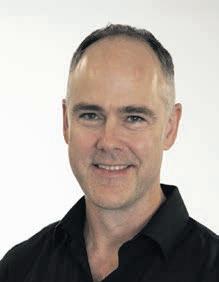
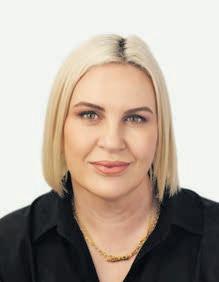

Founded in 2007, Rapson Loans and Finance is a fully independent finance and loans company based in Tauranga with a client base all over New Zealand. The Rapson team is dedicated to helping families and individuals achieve their financial dreams.
Whether you’re a first-time home buyer or an investor, Rapson’s team is committed to providing expert financial advice and tailored solutions that usually go beyond what a single bank can offer. With a focus on putting people first, the team strives to make the financial journey as stress-free and seamless as possible.
At Rapson, we are lucky to have a team of experienced financial advisors. Our highly experienced and professional team can help with all your loan, mortgage, insurance and investment needs. Together, we provide the total solution. We’re all focused on the same goal and that is to deliver the best possible outcome for you.
Tristan Hewett
Director, Financial Adviser –Mortgage, Business & Commercial Finance
Tristan is one of our directors, specialising in Mortgage, Business & Commercial Finance.
Tristan has a wealth of experience as a business development manager in the rural, banking and investment sectors. He is dedicated to helping clients achieve their financial goals by offering tailored solutions and strategic insights. With a strong foundation in business development across diverse sectors, he brings a unique perspective to the team and ensures that clients receive the highest standard of service and support.
Brooke Reynolds Director, Financial Adviser –Mortgage, Business & Commercial Finance
Brooke is our other Director, specialising in Mortgages, Business & Commercial Finance.
Brooke has over two decades of experience in finance. Her solutions-focused mindset and unwavering work ethic have made her an invaluable asset to the Rapson team.
Recently named a finalist in the prestigious Elite Women 2023 awards, Brooke’s outstanding contributions in the mortgage industry speak for themselves –helping clients meet their financial goals and finds it particularly rewarding to help first-home buyers make it onto the property ladder.
Jacques Pitts
Financial Adviser – Mortgages
Jacques is an experienced account manager in both the sales and finance industries. He has a track record of building relationships, managing large accounts, and problem-solving.
Jacques is dedicated to helping clients find the ideal mortgage option while making the difficult process seem simple.
Trudie Rutherford
Financial Adviser – Risk
Trudie is a risk specialist, with over 15 years of experience in the financial services industry. She has a passion for working with families, understanding



their specific needs, and formulating a tailored plan for them to protect their debt and income within their budget.
Michelle Schwab
Financial Adviser – Mortgages
Michelle has an entrepreneurial background across the real estate and finance industries. Being a business owner gives Michelle a unique understanding of home loan policies and budgets. She offers valuable insights into the local Bay of Plenty real estate market.
Michelle has gained experience in both Australia and New Zealand and has worked in finance and lending.
Andre October
Financial Adviser – Mortgages
With a passion for property and investments, Andre brings a wealth of experience with a diverse work background in the mining and construction industries.
Now as a financial adviser, his expertise is focused on guiding individuals towards financial success.
With experience like this on offer, it is no wonder why more New Zealanders are choosing mortgage advisers for their first home loans and financial needs.
Recent statistics released from the New Zealand banks have confirmed that the number of Kiwis using financial advisors and mortgage brokers is increasing year on year. The Bank of New Zealand confirmed the adviser channel accounted for 34.8% of BNZ



home loans compared to 30.7% of the previous financial year. As part of their FY23 results, ANZ confirmed the proportion of home loans through advisers was 60%, up from 56% for FY22.
In the six months to September 30, 2023, Kiwibank confirmed that the percentage of new home loans (by value) originated from mortgage advisors was 58%.
For Westpac, adviser-introduced home loans represented 51.9% of Westpac NZ’s total portfolio (as of September 30), up from 50.1% in the previous 12 months.
One of the key contributors to this development is the complexity of the New Zealand housing market. There is an array of banks and other lenders offering a wide range of mortgage products, each with unique terms and conditions, which can be bewildering for firsttime homebuyers. Navigating through this landscape can be simplified with the aid of a mortgage adviser.
The team at Rapson provide detailed, personalised advice based on each client’s individual requirements and financial situation. With our established connections, and over 50 years combined experience in the industry we have the potential to negotiate more favourable loan terms, such as interest rates and repayment schedules.
Here at Rapson, our service goes beyond mere advice; we offer bespoke guidance, to ensure the most beneficial loan conditions through negotiation, and enable our clients to make well-informed decisions.



The Tauranga City Council Commission’s focus for the first four months of 2024 is very much on finalising and adopting the 2024-34 Longterm Plan (LTP).
> By ANNE TOLLEY, TAURANGA COMMISSION CHAIR
As mentioned in previous columns, a key feature of the draft LTP, from a business perspective, is the proposal to introduce a new industrial rating category. And, from a longer-term perspective, the opportunity for the community to express its views on the SmartTrip variable road pricing concept, as a way of addressing traffic congestion and financing future road network improvements, will also be of significant interest to businesses generally. More on that later.
The industrial rate proposal was based on the need to ensure that different categories of ratepayers are contributing fairly to the cost of running the city.
While industry, which is defined by land uses devoted to industrial operations and port, transportation and utility network activities, contributes much to our community, these businesses have a disproportionate impact on our roading network and environment and the LTP consultation process sought feedback on whether they should be paying more than other commercial ratepayers towards the
council’s funding requirements.
Just over 65% of some 1200 submissions on this subject supported that perspective, and the proposal that an industrial category should have a rating differential of 2.7 (i.e. industrial ratepayers should pay 2.7 times the residential general rate, calculated on property values), to be phased in over a three-year period. For other commercial ratepayers, that would allow the current 2.1 differential to remain unchanged.
The Commission will be considering all of the submissions on this subject at the LTP deliberations meeting in early-March and while no decisions will be finalised ahead of the adoption of the LTP in late-April, we do have to make a balanced decision based on fairness and the best interests of the city as a whole.
Feedback on the SmartTrip concept was substantially negative, and in any event, would require major legislative change before the idea could be advanced. However, there are some complexities that need to be taken into account in any future thinking about
Tauranga’s Urban Task Force (UTF) is celebrating its third anniversary, having more than doubled its membership during a transformational time for the city.
The organisation represents Tauranga property owners, developers and business communities and advocates to support the city’s growth and encourage collaboration.
UTF Chair Scott Adams and his fellow board members have over 230 years of combined property industry knowledge and expertise.
“In late 2020 the idea of a Tauranga-focused property industry group was initially floated, to unite some of the growing factions and work together for a prosperous city built on the backbone of a strong and successful property and development sector,” Adams recalls.
“At the time, Tauranga was in a state of crisis, with non-performing elected councillors replaced by commissioners, a deserted CBD, record property prices despite decades of under investment in local assets and civic amenities, and a severe shortage of zoned and serviced land for new housing.”
In the past 12 months UTF has weighed in on local government planning changes, housing development proposals, natural hazard mapping, SmartGrowth strategies, infrastructure decisions, and Tauranga City Council’s Long-term Plan.
They’ve also held public meetings to hear from local political candidates and hosted guest speakers such as former Min-
> So far, Tauranga is the only council in the country which has consulted on the road pricing concept, which would likely be very similar to the congestion charging proposed by the Government.
road pricing. These include:
• If we don’t have a circuit-breaker that encourages people to use our roading network differently, the current congestions problems will only get worse. That will likely mean more time sitting in traffic jams, which would obviously have a productivity impact for the commercial sector;
• Road pricing could raise a substantial amount of money to improve the transport network, paid for by all road users (not just Tauranga ratepayers) – funding that rates could never provide;
• And, most importantly, the whole matter may well be taken out of our hands. The National Party’s transport policy is to “introduce congestion charging as a new tool to help reduce travel times in our congested cities”. Coalition partner New Zealand First also wants an inquiry on the use of road user charges instead of fuel excise to increase the efficiency and productivity of the national roading network.
So far, Tauranga is the only council
ister of Finance Grant Robertson and ASB Chief Economist Nick Tuffley.
“We’ve proven that a collective voice and unified action is the most effective way to drive change,” Adams says. “Our members are passionate about Tauranga and seeing the wider region succeed. We’ve seen some strong steps in the right direction to invest in much-needed infrastructure and community amenities. But there’s still a lot to do.”
Tauranga continues to have a chronic housing and land shortage. Based on current growth projections, the city will be short 80,000 houses and 400ha of industrial space by 2050.
“As an organisation, we are looking forward to working with the newly elected council and mayor later this year to continue the progress being made, and to help tackle the big issues like transport and land supply that continue to hold Tauranga back.”
Adams says access to housing, community facilities and infrastructure such as roading remain a priority. UTF will continue to focus on specific goals of increasing land supply, attracting central Government funding, investment in transport, infrastructure, education and civic amenities for the benefit of the whole community.
“Since our first year, we have more than doubled our membership and all our members are accountable to their counterparts, their colleagues and community. The future of Tauranga will be our members’ legacy.”

in the country which has concharging proposed by the Government. We therefore have

in the country which has consulted on the road pricing concept, which would likely be very similar to the congestion charging proposed by the Government. We therefore have some rich feedback to pass-on to central Government as it considers how best to address traffic congestion, the need to reduce carbon emissions from transport activities and future transport funding for Tauranga and the country as a whole.


gestion, the need to reduce carbon emissions from transport activand the country as a whole. ate on this ation as we plan for the next 10
As you can see then, we have much to deliberate on this month, and to take into consideration as we develop our final plan for the next 10 years.





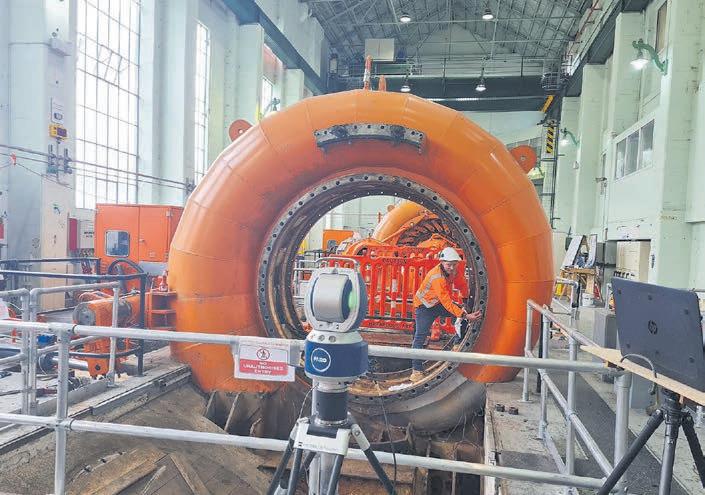
Advantages of engaging recruitment specialists to support your hiring strategy
Recruiting new employees can be costly and takes both time and energy, so it’s understandable if your heart sinks a little when the need to hire a new employee for your business arises yet again.
Employers are recognising the value of top talent, particularly those individuals who can drive their business forward and boost the bottom line. HR teams are facing a tricky task when it comes to ensuring a flow of continual talent into their business, and making sure they hire staff who are suited to the job and the culture of their organisation.
In a labour market, where employers are competing with for the most skilled and experienced staff, this challenge becomes even more difficult.
In many cases, employers seek assistance from recruitment companies to support their hiring strategies. Using a specialist recruitment agent to identify and attract talent, and negotiate terms, can relieve a huge amount of pressure and stress, and most of all, this approach is not as expensive as you may think.
What is the price of recruitment?
Every business needs to recruit employees at some stage. After all, staff are a business’s biggest asset. But bringing the best talent to your business comes at a price.
Recruitment costs are the fees associated with finding talent, hiring, and onboarding new employees. This includes the cost of advertising the vacant position on Seek, Trade Me and LinkedIn for example, screening and interviewing candidates, conducting pre-employment testing, background checks and training new employees.
It is also important to con-
sider the added expense of salaries associated with in-house recruitment/HR teams, internal commissions, or employee referral bonuses if applicable to your business, and the investment in software and systems that are used to hire employees and manage the recruitment process from end-to-end.
It is also important to consider those non-monetary expenses that are hidden as well, such as the time invested by hiring managers during the recruitment process. In business, time is valuable. While you may have already allocated a certain financial cost to recruitment, including the expenses noted above, it’s easy to underestimate the time it takes to hire a new recruit.
Writing a job description and advert and posting it online also takes time out of your hiring managers busy day. Not to mention filtering applicants which may take considerable time. Then, when you finally reach the decision to hire someone, the negotiation stage can draw out the process further. Although these elements of the recruitment process don’t come with a defined price tag, they still contribute to the cost of recruitment.
The recruitment process can be time-consuming and resource intensive. Outsourcing recruitment allows your internal HR team to focus on strategic initiatives and other core business functions. Specialist recruitment companies take care of candidate sourcing, screening, and initial interviews, saving you time and effort.
Partnering with a recruitment agency can help you fill vacant positions faster, reducing the timeto-hire timeframe and minimise any negative impact an unfilled
position may have on your operation. We often don’t consider the cost of an ‘empty chair’, whereby recruiting managers overlook costs that pile up as vacant positions remain unfilled. According to a recent study by Career Builder, employers are losing between $14,000 and $30,000 for every job that remains unfilled for a period of three months or longer (role dependant).
These costs are caused by lost productivity, stress and increased workloads for team members, a decrease in employee morale and engagement, poor customer interaction from slow response times and most of all, managers spending time doing tactical work rather than focusing on their higher-level strategic initiatives.
Recruitment agencies are dedicated to finding and attracting talent. They have extensive experience and expertise in sourcing, screening, and assessing candidates. By outsourcing recruitment, you can leverage their specialised knowledge and experience in the talent sourcing field.
You can also benefit from their access to a wider talent pool than what might be available to an individual organisation. They have established networks, connections, and a database full of candidates to tap into, enabling them to reach both passive candidates who may not be actively seeking new opportunities and those who are searching for their next career move. This increases your chances of finding top talent for your organisation more quickly.
Outsourcing recruitment provides flexibility in managing fluctuating recruitment needs. Whether you require assistance with a single position or need to handle high-volumes of new staff, agencies can adjust their resources accordingly to ensure your variable recruitment needs
are met. They can quickly ramp up or down their efforts based on your requirements, ensuring a scalable recruitment solution.
Recruitment agencies are well-versed in efficient hiring processes. They can quickly identify suitable candidates, screen them effectively, and move them through the selection process promptly using modern recruitment technology. From applicant tracking systems (ATS) to candidate sourcing and onboarding software, most recruitment companies use technology to streamline and automate the recruitment process.
Additionally, management of the candidate experience is particularly important for building and maintaining your employer brand. A specialist recruitment firm will manage each step of the candidate experience for you, and partner with you to ensure your business values, culture and ethos are upheld.
Employment laws and regulations change all the time and keeping on top of compliance requirements can sometimes be overwhelming, particularly for smaller organisations who do not have in-house HR expertise. Recruitment agencies ensure your hiring process remains compliant, fair, consistent and follows best practice recruiting methods.
Finally, another bonus is recruitment agencies often have a database full of candidates seeking employment. Partnering with an agency and following a temp to hire model allows you to hire temporary staff with the goal of determining whether they are qualified and suited for a permanent position with your company. This arrangement benefits both parties, by giving businesses and employees a chance to try things out before committing to a fulltime position.

BY KELLIE HAMLETT
By now, you will be realising how beneficial a specialist recruitment company could be to the success of your business.
If your internal team lacks specialised knowledge or experience in recruitment, outsourcing can be a viable option to bridge that gap.
If you anticipate a surge in hiring needs due to expansion, seasonal demands, or specific projects, outsourcing recruitment can help manage the increased workload more efficiently.
If your internal HR team is already stretched with multiple responsibilities, outsourcing recruitment can alleviate the burden and allow them to focus on other critical tasks.
If you require recruitment support, we challenge you to assess and compare the costs of hiring in-house versus outsourcing to a specialist recruitment agency.
Once you crunch those numbers, you’ll be surprised how outsourcing can be such a cost-effective option for your recruitment strategy.
Talent ID are Recruitment Specialists and can support you through your recruitment process. Please feel free to talk to us about this by calling 07 349 1081 or emailing kellie@talentid.co.nz
People will often remember how you do something rather than what you do. For instance, I just bought a new iPhone and after having used android for years I felt like a monkey trying to open a lock with a banana.
The sales assistant took time to teach this old technological troglodyte how to use it and showed me features that, as an android user, I might find different to what I was used to.
He didn’t have to do that – I had already purchased the phone and there was a line of people waiting to buy. But because he took the time, I look back on the transaction as a demonstration of respect, genuine customer care and an

CONTROL BY
NICK KERR
altogether pleasant experience. As far as the phone goes, as long as I can jab at it and make a call, I’m pretty happy. If I break it I will go back and get a new one from the chap who took a bit of extra time to ensure a happy customer.
Products don’t make relationships, people do. In my own business, IPI Group, and especially in our asset recovery division, we have made kindness and respect our overarching ethos.
In more than 4000 cases, the result of this ethos is an extraordinarily high recovery rate (our clients’ words), very happy clients and surprisingly (for the repossession industry), multiple letters of thanks from debtors for the way they were treated at a difficult time.
In an industry that has a reputation for thuggery and forced compliance we decided to do it differently and it has paid off big time. We have a 100% client retention rate and a long line of com-
panies wanting to work with us.
Our marketing spend is lower, our accounts receivables are current and our job satisfaction level is higher. When you have a choice to harm or help, why not help?
It costs nothing for us to put the debtor in touch with a budgeting advisor, explain their rights and recourse options, spend some time hearing their story, offering advice if asked and treating them according to who they are, not what they have done, or in this case, not done.
Sometimes in business we have to toe a hard line, be it with employees, suppliers, clients, debtors or other industry participants. But there are ways to do things that can improve even the toughest of situations or conversations.
No situation has ever been made better by omitting respect and kindness.
I don’t care how amazing someone is at what they do, if they aren’t pleasant to deal with, people will not recommend them to the people that matter to them.
This is especially important in a slower economy or in a frustrated industry as people will go out of their way to support people who go out of ‘their’ way to support people – it’s a cycle of kindness and that can only ever be a good thing.
Just a thought.
Nick Kerr is the director of IPI Group. He can be reached on 021 876 527 and nick@nzipi.com
There is no set-in-stone right or wrong moment to sell your business. It’s up to you to decide when it’s time. But how do you actually make that decision? There are several reasons why selling your business may be the best choice for you.
1. Long term business goals
reached
In additional to achieving strong ‘financials’, many businesses also pursue significant internal goals; perhaps process-alignment to become more operationally efficient, perhaps development of new products or securing new markets. The achievement of such goals is often a good time to reflect. When their particular business- transformation project was successfully completed, one
of my clients took the opportunity to exit their business.
2. Additional resources needed
Sometimes good businesses with great revenue and profit reach a point where fresh perspectives, additional resources, or specific new skillsets and expertise are needed to achieve new heights.
The influx of capital and talent that a new owner can bring might just be what the business needs. A purchaser that I recently assisted has been able to move an acquired business forward significantly by applying their own specific expertise and resources.
3. Business in good shape/Experienced, loyal staff
The numerous High-Value business sales that I brokered recently all typically have good ‘staff devel-
opment’ structures/processes in place, with senior staff making many operational decisions. As a result, their businesses continue to flourish. Such businesses are also attractive to passive investors not necessarily wanting a hands-on role.
4. Aligning with Personal Goals
Selling your business can also be the path to achieving your longterm personal goals. Your dreams and aspirations may include retirement, travel, pursuing a different career or a change in lifestyle.
The financial gain from selling your business can be a catalyst for actualising these goals, making it a strategic move to align your professional and personal aspirations. Several of my recent
clients are now enjoying their retirement after selling their high value business.
5. Pursuing New Opportunities
Entrepreneurs are known for their innovative spirits and the drive to explore new horizons. Perhaps you have a brilliant new business idea or wish to change industries. Therefore, selling your current business can provide the capital and freedom needed to turn your dream into a reality. One of my recent clients sold their multimillion-dollar business and then moved offshore to start a new venture. Selling your current venture doesn’t mean abandoning entrepreneurship. Instead, it could be a transition into a new beginning. If any of these points resonate

SALES BY STEVE CATLEY
with you, then it might be time to start thinking about selling your business. It’s important to remember that selling your business is not merely an end; it’s the beginning of a fresh chapter where you can continue to succeed in different ways.
is a Business
at LINK Business Brokers. He can be contacted at 021 341 117 and steve.catley@linkbusiness.co.nz
Getting started in the SME business world is daunting. If you are looking at purchasing an existing business, the banks will look at the historical performance of the business, who’s involved, the industry sector, leases, location and a myriad of other factors. If you are looking at a start-up, it gets even harder. Either way, for savvy investors seeking the most fundable ventures, the smart money is on a franchise business. Here’s why:
At the heart of the franchise business model lies a proven and replicable business system. Unlike independent start-ups that must navigate uncharted waters, franchise businesses operate within well-defined frameworks honed through years of trial and refinement. The franchisor has already laid the groundwork, fine-tuned operational processes, marketing strategies, and customer service standards to perfection. As a result, franchise businesses boast higher success rates and lower failure rates compared to their independent counterparts. This

BY NATHAN BONNEY
track record of success instils confidence in funders, making Franchise businesses an attractive option for funding.
Franchise businesses possess a unique advantage when it comes to delivering higher gross profits. Through the implementation of standardised systems, collective purchasing power, and the sharing of collective knowledge within the franchise network, franchisees can achieve economies of scale that are simply unattainable for independent businesses. By leveraging these resources, franchisees can optimise operational
efficiency, minimise costs, and maximise profitability.
Whether it’s negotiating favorable terms with suppliers or implementing best practices in marketing and sales, franchise businesses are well-positioned to deliver impressive gross profit margins. The banks know this, and the better the system performance, the better the individuals’ chances of being able to be funded.
The above points make the assumption that banks and other funders have knowledge and understanding of a particular franchise system or perhaps a particular sector. In many cases they do, they have these insights through what are perhaps franchising’s twin secret weapons when it comes to fundability: benchmarking and franchise relationships with banks.
Benchmarking allows franchisees to analyze and adopt best practices within their industry. It’s a powerful tool used to measure performance and identify areas for improvement. By comparing performance metrics across the
franchise system and individual businesses, franchisees gain valuable insights into their strengths and weaknesses.
Quality benchmarking also fosters a culture of continuous improvement within the franchise network, ensuring that franchise businesses remain competitive and resilient.
When it comes to a start-up, banks will rely heavily on the systems benchmarking information to make a funding decision. In many cases, for the independent business, this type of detailed information is just not available.
The second secret weapon is franchises often enjoy longstanding relationships with banks and financial institutions that specialise in lending to the franchising sector. These institutions have a deep understanding of the franchise business model and its inherent strengths.
As a result, franchisees enjoy easier access to funding and financial support, whether it’s in the form of loans, lines of credit, or other financing options. This support from banks further enhances the fundability of franchise busi-

nesses, making them an attractive investment opportunity for savvy investors. Moreover, the proven track record of success and lower rates of failure associated with franchised businesses further mitigate the perceived risks for lenders, making them more willing to offer favourable terms and conditions.
The fundability of franchise businesses stems from their proven business model, higher success rates, and ability to deliver higher gross profits through standardised systems, purchasing power, and collective knowledge. Additionally, franchise businesses leverage secret weapons like benchmarking and strong relationships with banks to maintain their competitive edge and attract funding. For investors seeking stable returns and lowrisk investment opportunities, franchise businesses emerge as the gold standard in the world of entrepreneurship.
Nathan Bonney is a director of Iridium Partners. He can be reached at nathan@iridium.net.nz or 0275 393 022

As another tax year draws to a close (for those with a standard 31 March balance date) there are some key things to keep in mind.
If you have debtors that are unlikely to pay you, these can only be treated as deductible bad debts if they have been fully written off in your accounts before year end.
For companies, your imputation credit account should have a nil or credit balance at 31 March, regardless of balance date, as a debit balance at 31 March will result in penalties. This should be carefully monitored, especially if:
• you have paid out imputed dividends
•you have received tax refunds
• there has been a loss of shareholder continuity
Check your fixed asset register
to ensure the correct Inland Revenue tax depreciation rates are being used.
New assets should be depreciated from the beginning of the month of acquisition, rather than from the date of purchase. Pooled assets can be depreciated from the start of the year of acquisition. If you are writing off assets, make sure they are disposed of by year-end.
The ability to claim tax depreciation on commercial and industrial buildings is expected to be removed effective 1 April 2024 for March balance date taxpayers.
Check your fixed asset register and consider whether you need to update the depreciation rates of any relevant building assets.
Businesses with significant building assets may need to consider the effect of increased taxable income on forecast tax payments.
Assets that cost less than $1,000 are considered “low value assets” and can be immediately deducted,
rather than depreciated. If multiple low value assets are purchased at the same time from the same supplier, the combined cost must be less than $1,000 for the immediate deduction to apply.
Obsolete trading stock can be valued at market selling value where this is lower than cost and you can substantiate the valuation.
Be aware of the rules regarding shareholder continuity and business continuity if you have losses to carry forward. Breaching both during the year can result in your tax losses being forfeited.
31 March is also the end of the FBT year, regardless of your financial balance date. Annual FBT returns and returns for the March quarter are due to be filed by 31 May 2024. If you have not done so in the past, you should consider using
the various alternate rate options available to reduce FBT payable from the standard 63.93% rate.
If you are GST registered and have assets that are used to make both GST taxable and GST exempt or non-taxable supplies, you may need to make an annual change of use adjustment in the GST return period that includes your balance date.
With the Inland Revenue use of money interest rate currently at 10.91% on outstanding tax payments, it may be prudent to consider using tax pooling to reduce the effective rate of interest. Tax pooling can also provide the flexibility to make your tax payments at times that suit your own cashflow patterns.
If you have employees, you need

BY ANDREA
SCATCHARD
to review the ESCT rates that apply to your employer KiwiSaver contributions as these may change on 1 April based on earnings levels over the last 2 years. Year-end is a busy time, so if you have any questions or would like help with any year-end tax issues, take out the stress by talking to a tax professional.
Andrea Scatchard is a Tax Partner at Deloitte, based in the Bay of Plenty. She can be contacted on ascatchard@deloitte.co.nz
As we approach International Women’s Day I have been thinking about my role as a Chief Operating Officer (COO) in an IT company and reflecting on my career. If I had asked the child version of myself whether I thought I would be here, I honestly would have said no. Thankfully along the way I have met some inspirational people who have changed my life. There were those who pushed me to be the best version of myself, even when I couldn’t see it, and then there were those who told me I would fail and never amount to anything. Both have driven me equally for different reasons.
I was having a conversation recently and was asked where I learned to be such an empathetic, forward-thinking, strong leader? It was an interesting question. For me, as much as I learned les-
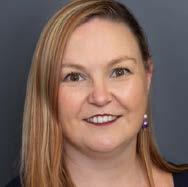
sons from leaders that I admired, I also learned from those with less desirable traits - those who were bullies, unjust, unreasonable and incapable of seeing beyond themselves. They taught me to recognise what I didn’t want to be and reinforced my determination to lead through compassion, support and trust.
During this same conversation I was asked about the best piece of advice I have ever received. Funnily enough this was from a male speaker, whose name I sadly don’t remember. During his presentation he bluntly stated that women have a harder time being seen as credible leaders and speakers. His reasoning? When a professional man gets up to speak people listen to what he has to say taking little notice of what he looks like. However, when a professional woman addresses an audience, she is often first assessed on her ‘looks’ and only if they like what they see will they listen. Sadly, I have experienced this firsthand, but being armed with this advice has helped me understand the way a lot of people think and navigate what is still a very male dominated industry. You may laugh, but I have per-
sonally been in situations where I have had three meetings on a particular day, and I have had to change my appearance for each of them.
Please don’t misunderstand me, I haven’t allowed this to perpetuate and as a female leader in the industry I have made it my responsibility to address these stereotypes and narrow-minded views. I have never been afraid to challenge male colleagues ‘head on’ and educate with some considerable success. There is still plenty of work to do, but fortunately I’m now in a company that understands what I bring to the organisation and they embrace it.
Notwithstanding the challenges, working in the IT industry has been a hugely rewarding part of my life. The pace is fast, the work is energising and exciting, and everything I do is to help
people do what they do better so they can go on and achieve great things. This gives me a huge sense of satisfaction and drive. So what advice do I want to impart to other women trying to make it as an executive in a male dominated environment? Be that women that helps others to rise and seek out others like you for support when you need to –you’re not alone. If you find that ladder that lets you climb, then leave a map for others to find. Be that sister building up others, be that trailblazer who cuts a path for others to follow and most importantly be the role model the younger you would have wanted to look up to.
Kate Murdoch is Chief Operating Officer at Stratus Blue. She can be contacted at kate@stratusblue.co.nz


The workplace is full of apps, schemes, and coaches designed to optimise your wellness. But could the quest to turn yourself into a perfectly balanced professional eventually turn your life upside down?







If your New Year’s resolutions to be fitter, leaner, greener and kinder have been thrown into the trash can labelled “Try again in 2025”, then you’ll want to cut out this article and stick it on your wine fridge.
When it comes to healthy living and workplace wellness, what if you were doing it all wrong?
What if investing the entire company Christmas party budget on yet another ‘wellness app’ with a funny name consisting entirely of consonants (VTLTY or HLTHY spring to mind) was actually the worst thing you could do for employee performance?
Or perhaps the secret to business success wasn’t having a healthy, well-rounded workforce, but actually the opposite?
You might think I’ve overindulged in kale smoothies at the chillout bar, but there’s a growing argument that shows a ‘wellness workplace’ is actually the last thing Kiwi businesses need in 2024.
Through my career, I’ve been at both ends of the workplace wellbeing spectrum.
I’ve arrived at work on Monday morning after getting 10 hours of sleep and running a half-marathon before breakfast.
I’ve also rocked up at the office with precisely zero hours sleep, smelling like I’d been snogged by Jack Daniels himself, after sprinkling a cocktail of substances on my cornflakes.
And I can say with some authority that the former inflicted equally – if not more – damage on my career than the latter.
My career rollercoaster high-
lighted a harsh truth that most businesses ignore:
The existence of workplace wellbeing apps, lunchtime yoga, morning tea mindfulness, and a delightful selection of herbal teas where the espresso machine used to be didn’t make a damn bit of difference to my performance.
What these things did achieve, however, was for the leaders of our business to virtue-signal while totally ignoring the issues that were causing me – and so many others – to self-manage our stress in the worst way possible. Plus, they were able to waste a hell of a lot of money in the process.
But too many people are afraid of asking an important question because they know they won’t like the answer: What if workplace wellbeing isn’t working?
Yes, wellness is important. But too much emphasis on wellness – especially at the expense of performance, creativity and resilience – can throw team performance into a death spiral.
This flies in the face of everything we’ve been taught. But seriously, how many more articles on ‘wellness hacking’ do you need to read?
How many times must you drag a self-styled ‘mindset coach’ into the office to deliver the earth-shattering news that switching from a pizza and vodka-based diet might be a good idea? How often have you nodded and muttered something along the lines of, “I should get more sleep / exercise / time away from the phone”.... and then made absolutely no changes whatsoever.
So why do you believe you

> We are creating a generation of employees who drop deadlines for deep breathwork classes, dodge confl ict in favour of candle meditations, and can’t set boundaries because they’re too busy barefoot walking.
need more of the same?
We are creating a generation of employees who drop deadlines for deep breathwork classes, dodge conflict in favour of candle meditations, and can’t set boundaries because they’re too busy barefoot walking.
We’ve become so desperate to make everyone ‘well-rounded’, that we have removed their edge. What happens when you remove someone’s edge: They become dull.
So, you’re left with a workforce that is dull, lifeless and possessing the backbone of a jellyfish washed
up on Omanu Beach.
But hey, at least they got seven hours of REM sleep last night. Pity you can’t pay overdue invoices with optimised sleeping patterns.
An optimised, healthy, wellrounded team is what every business says they WANT, but if you dare to look into the history books, you will discover this is the last thing an industrious, powerful, fast moving enterprise NEEDS.
Caesar, Joan of Arc, Shakespear, Lincoln, Edison, Churchill, Roosevelt, Mandela, Martin Luther King Jr… do you think they were all getting a solid eight hours on the pillow, tracking their macronutrients and ensuring they hit 10,000 daily steps? No.
You tell the world you want to create a team of leaders, yet you encourage your people to adopt precisely the opposite behaviours demonstrated by the greatest leaders in history.
Better yet, you say you want to create teams of high-performing people doing important work … but consider the teams doing TRULY important work in the world right now: Saving lives in the battlefield operating theatres of Ukraine; In the Amazonian jungles searching for a cure for cancer; Developing technology to take humanity to Mars in the tech labs of California.
I guarantee those teams are fuelled by sleep deprivation, sugar, caffeine, nicotine and energy drinks.
But you allow Karen and Kevin from the project management
team to tell you they can’t submit their status report on time because they mistakenly added milk to their soy latte.
So, if workplace wellness isn’t the answer, then what is?
I’m not saying your office has to become the set of The Wolf of Wall Street
But stop relying on the latest mindfulness tool as an excuse to dodge what really matters. Give your people the resources they need to fix your customers’ most pressing problems.
When a team member’s life has taken a disastrous turn, give them your time, focus and attention, not the login details for a Chat-GPT powered AI counsellor. And most of all, give them challenges and the space and support to screw up and fail.
A resilient, ambitious, workforce is not created in a cotton-wool-padded therapy room. It is forged in the fire of change and failure.
When did you learn to not touch a hot stove: When an adult tried to ‘protect’ you? Or when you touched a hot stove?
So, if you want the best for your team, colleagues, and leaders, stop wasting time, energy and money on being the comfort blanket.
Be the hot stove.
Freddie Bennett is a Guinness World Record holder, bestselling author and leads New Zealand’s most secret mastermind group, Titan Sky. He gets businesses unstuck, unshackled and unleashed. Freddie can be contacted at hello@freddiembennett.com

As a young person I was sometimes anxious: before an exam, leading up to a job interview’ or prior to a big game.
My expectations were simple: pass the exam, get the job, and maybe win the game.
Any anxiety was unpleasant, but manageable: a sleepless night or two, butterflies in the stomach and perhaps a short-lived loss of appetite.
The recommended treatments were rudimental: take a few deep breaths, get out of bed, and adopt a ‘just do it’ mindset.
From a young age, like most of my friends, I was left pretty much to my own devices when it came to dealing with the anxieties that confronted me.
Consequently, the enormity of the anxiety-inducing challenges wasn’t overblown in my mind: my parents hadn’t paid for extra tuition, and my guidance councillor didn’t focus on the imperative of achieving minimum grades
(because we didn’t have guidance councillors). My social influencer role models – Mum and Dad and Uncle Kevin – at no time suggested to me that if I was going to feel okay about my life, then I needed to drive a new Lamborghini and fly my own private jet by the age of 21. Their advice was much simpler: just do your best.
In hindsight, such an uncomplicated approach to life challenges was refreshingly manageable.
Don’t change channel …this is not another boomer tirade suggesting kids nowadays need to harden up … if only it were that simple. Life for young people now is so much more complicated.
I mean, don’t get me wrong, I wanted the Lambo’ and the private jet – I still do – but I wasn’t constantly confronted with reels of real “successful” people making my modest accomplishments feel like pathetic failures. I wasn’t bombarded with friends’ new Insta profiles showing them looking like celebrity models
(yet them swearing they hadn’t used a filter), while I looked in the mirror and saw just acne and geekiness.
No wonder so many of our kids are regularly hamstrung by anxiety nowadays. For years kids have been encouraged to be their ‘best selves’, work harder, look better, be healthier, get better jobs, better grades, be richer … few have been encouraged to just be happy.
Not by coincidence, anxiety among young people has become increasingly prevalent. Young people face immense pressure to excel academically, socially, and professionally. The weight of expectations from parents, teachers, and society can lead to heightened anxiety.
Perhaps in our roles as parents, teachers and employers we should focus less on endlessly encouraging young people to excel and be exceptional, and instead encourage them to simply always do their best without con-
stant reference to a league table of achievement.
I was pleasantly surprised to hear two high school teachers last week applauding positive impacts they’d unexpectedly noticed from the ban on cell phones at their high schools – less disruption in class, and kids actually speaking to each other and playing in lunchbreaks. The teachers were both genuinely surprised at the positive change which they had envisaged would be far more problematic. Actual human interaction requires active participation in ways that ‘passive’ TikToks don’t. When you are learning to ‘come out of your shell’ at the age of 13, some active participation is usually a good thing.
I hope the cell phone change will have a positive long-term impact on reducing anxiety in students. If we want to feel okay about ourselves, let’s talk face-toface and support each other, not rely solely on social media feeds to serve us a never-ending stream
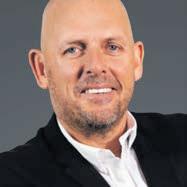
HAVE YOU EVER NOTICED?
BY ALAN NEBEN
of unrealistic mirages.
At the one time in life when you are finding out who you are –your teenage years – how demoralising to be constantly smacked in the face by images of the you you can never hope to be.
While there are countless more factors than just social media contributing to the mental health challenges afflicting so many young people in New Zealand today, I believe one condition, social media disease, can be treated. But a warning: rehab could be a very, very long process.
Alan Neben is a Mount Maunganui local and experienced New Zealand publisher. His columns provide a light-hearted perspective on social changes effecting New Zealanders.
The enduring problem of New Zealand’s productivity is getting a jolt in the arm thanks to the efforts of 2degrees. The telecommunications provider has partnered with Christchurch agency Smudge to create Digital Accelerator, a programme designed to unlock the transformative power of technology. There’s a slight catch though, valued at $50,000, Digital Accelerator is being awarded to just two successful applicants.
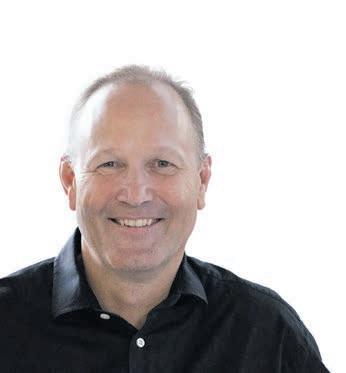
AndrewFairgray, Chief Business Officer, 2degrees


a selected
hief Business Officer Andrew Fairgray says these two businesses will receive ‘an intensive programme’. “Digital Accelerator will challenge, guide, and make digital transformation a reality for the selected organisations. We’re almost as excited as we expect the recipients will be, as we’ve seen the power of digital transformation directly within our own business, and in others.
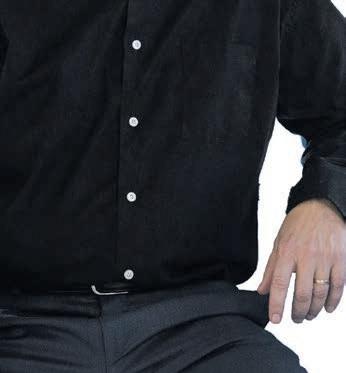

“We are always looking for inspiration when we create business products, and will take any learning from Digital Accelerator and ensure they inform what we offer to NZ Inc.
Fairgray says the 2degrees Shaping Business Study (available on the 2degrees website) has consistently shown that technology holds enormous promise for productivity – but adds that too many businesses just don’t have the time, knowledge, or resources to make it a reality.
A key finding of the most recent study shows that effective use of technology aligns directly with business performance, with 76% of thriving businesses saying digital technology improves productivity; 64% of reviving businesses noting digital technology improves productivity; and 50% of surviving businesses say digital technology improves their productivity.
amount more conveniently or in reduced time, so we can focus on more important things.”
However, the Study also confirms his assertion that some businesses aren’t taking advantage of those benefits owing to a shortage of the right capabilities: 19% of business leaders said they don’t possess the digital skills to help their business get ahead.
with the humble telephone, but today extends to video calling, remote working, information accessibility, cloud applications, and more. The enabling infrastructure is mind-boggling; 2degrees, for example, operates 4,600km of its fibre and 2,110 mobile cell sites, looking after more than 1,5 million mobile, 390,000 broadband, and 50,000 energy customers.
Fairgray says 2degrees is a proud supporter of BOP businesses. “We have five stores in the Bay, in Tauranga, Papamoa, Whakatane, and Rotorua, and we have also partnered with the experts at Somo – who are on the ground and ready to help you take your business forward.”


“There are multiple technological and connectivity aspects underpinning productivity that all organisations should focus on,” says Fairgray. “And sometimes, better productivity isn’t just about ‘doing more in one day’, it is about doing the same
“Harnessing technology is invaluable. But it has a catch – technology, for technology’s sake, is a recognised dead end that can complicate things or confound people. A strategic approach that starts by identifying problems and opportunities is key to a successful digital transformation, accelerating your business and making those productivity promises a reality.”
Fairgray notes that one of the most powerful forces associated with connectivity is the increased capability for collaboration. This started
For more information, visit 2degrees.nz and www.somo.co.nz
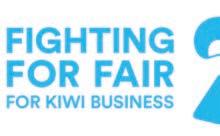

Copyright rights are “relationship property” (RP) for the purposes of the Property Relationship Act 1976 (PRA) (NZ).
So the Court of Appeal found in its now world-famous-in-New Zealand judgment of Alalääkkölä v Palmer [2024] NZCA 24, issued on 21 February 2024. Why ‘world-famous-in-New Zealand’? Because – legally, anyway – the judgment has potentially far-reaching consequences for artists and their ‘better halves’.
For readers not familiar with the background to the dispute between Ms Alalääkkölä and her former husband, Mr Palmer, the following is the brief summation provided by the Court.1
“The appellant, Sirpa Alalääkkölä, is an artist who has created many original artworks (the Artworks) during her 20-year marriage to Paul Palmer. Many of the Artworks were sold during the relationship, providing the main source of income for the family. Others were retained by the parties and are currently in the possession of the Family Court, pending final division of the relationship property. The present dispute, however, does not relate to the ownership or division of the Artworks. Rather, the key issue is whether the copyrights

BY BEN CAIN
in the Artworks (the Copyrights) are relationship property or Ms Alalääkkölä’s separate property.”
As noted, the Court found the ‘Copyrights’ are relationship property. Having done so, the Court had to consider how to divide the relationship property – a task not quite as easy as dividing books or coffee tables. At this juncture I am reminded (I hope not inappropriately) of that wonderful scene in When Harry Met Sally (1989), written by the late Nora Ephron, when Harry, embittered by his own personal experience, imparts his wisdom onto his friends Jess and Marie: Harry (standing in Jess’s apartment): Right now everything is great, everyone is happy, everyone
is in love and that is wonderful. But you gotta know that sooner or later you’re gonna be screaming at each other about who’s gonna get this dish. This eight dollar dish will cost you a thousand dollars in phone calls to the legal firm of That’s Mine, This Is Yours.
Sally: Harry.
Harry: Please, Jess, Marie. Do me a favor, for your own good, put your name in your books right now before they get mixed up and you won’t know whose is whose. ’Cause someday, believe it or not, you’ll go 15 rounds over who’s gonna get this coffee table. This stupid wagon wheel ROY ROGERS GARAGE SALE COFFEE TABLE!
Having considered the benefits and purpose of the Copyright Act 1994, the Court of Appeal held:
“[77] In our view this broader context strongly supports the view that, where possible, the division of relationship property under the PRA should reflect the unique and personal nature of copyright, particularly where (as here) the original works that have given rise to the Copyrights are artistic works that are personal in nature. The situation may be different if the dispute were, for example, over copyright in engineering drawings. But that is not the case.
[78] Here, it is our view that it is consistent with the overall policy objectives of the Copyright Act that Ms Alalääkkölä, as the author and creative force behind the Artworks, be able to continue to control the commercialisation of the Copyrights. It would be inappropriate and unfair to require her to transfer ownership of some of the Copyrights to Mr Palmer for a range of reasons,…
[79] Although the Copyrights are relationship property, and therefore subject to the equal sharing regime in the PRA, that regime does not require that each specific item of property be divided equally. Rather, the overall pool of relationship must be divided equally. Here, transferring some of the Copyrights to Mr Palmer would be inconsistent with, and would undermine, the “clean break” philosophy of the PRA. In contrast, allowing Ms Alalääkkölä to retain ownership of the Copyrights would enhance the prospects of the parties being able to move on with their lives (including their financial lives) independently and with a minimum of ongoing conflict. The appropriate course, therefore, is for the ownership of the Copyrights to remain with Ms Alalääkkölä, and for Mr Palmer to receive
a compensatory adjustment from other relationship property to ensure an equal division of relationship property.
The outcome in Alalääkkölä v Palmer will not necessarily be the same in every future case where IP meets RP; the outcome of each case will inevitably depend on the circumstances of each case.
Such circumstances might well include – and here’s the important point for all artists – the existence of a ‘contracting out’ agreement between the disputing parties.2 Under a contracting-out agreement, an artist and their partner could, in theory at least, agree that the partner will not receive any compensatory adjustment from other relationship property. As to whether, in reality, such an agreement could be struck, I venture no view except to say that the discussion might test even the strongest of relationships.
Ben Cain is a Senior Associate at James & Wells. He can be contacted at 07 928 4470 (Tauranga), 07 957 5660 (Hamilton), and ben.cain@jamesandwells.com
1.At [2] of the judgment. 2. Which are allowed under the PRA, as the Court of Appeal recognised at [51] of the judgment.

Rotorua Business Chamber Business After 5 with The National Kiwi Hatchery, 35 Dansey Rd, Ngongotaha Valley, 13 February, 2024
What a night to remember! Members were treated to an exclusive mini-tour of the nocturnal kiwi room and the heart-melting sight of a two-dayold kiwi. It was an experience that will be cherished. But the experience didn’t stop there! One lucky winner of the Business Card Draw scored a truly remarkable prize – the opportunity to name a baby kiwi!
Photography: Hine-Te-Rangi Elliot


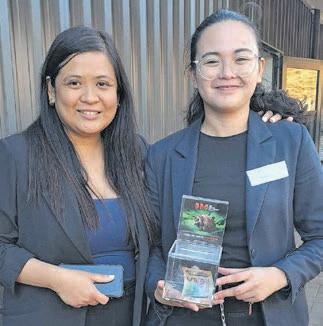








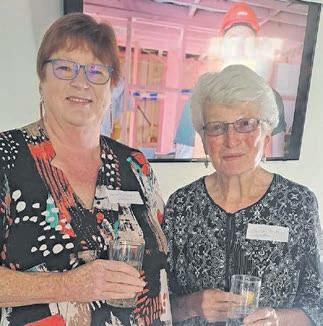

There will be a new Partner at Cooney Lees Morgan from 1 April this year –meet Chad Wallace. Chad began working with the Private Client & Trust team in 2015 before subsequently moving into the Property & Development team in April 2021. He leads a team that looks after one of New Zealand’s leading nationwide residential construction companies. As a Tauranga Business Chamber board member, Chad supports local authorities, developers, orchardists, farmers, trusts, and retirement villages. Acknowledged as a NZ Lawyer ‘Rising Star’, his rapid career ascent from law graduate to partner in just over a decade is a compelling journey.
After handing over the reins at a local manufacturing company in October last year, Jamie has started the new business consulting firm James & Co Bringing 15 years of senior executive experience and several years as a business awards judge with him, James & Co focus on rapid business reviews, strategy activation, general consulting and coaching and training future leaders. “It’s an exciting time when I get to
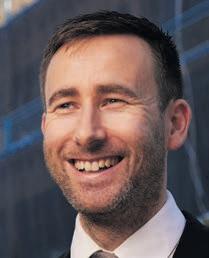
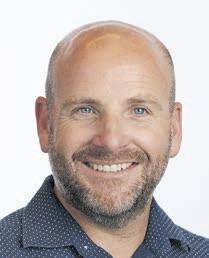
focus on the areas of business development that really light my fire,” says Jamie. “With several exciting projects online already, 2024 looks very exciting”. Jamie is also the Chair of Tauranga Business Chamber.
Joshua Gear has returned to Sharp Tudhope as Special Counsel. Gear has extensive experience in Environmental and Māori legal issues and has spent the past decade working as in house and independent counsel. During this time, he engaged with the Crown and provided advice to iwi on pre and post-settlement issues. He also regularly advises Māori entities and individuals on general trust, land, environmental and commercial matters. “The relationships I made at

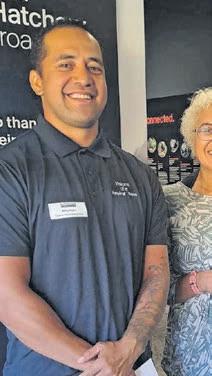

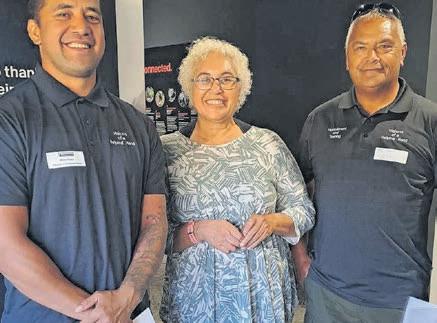
ONERexinaHulton(DawsonInsurance),NatashaHislop&ShelleyBurnett(Agrodome). TWOJeffFerguson,EdYoung(NZME). THREE JoelDunn&RhiannonMitchell(ProactivePestSolutions). FOUR Katie Black&TraceyVanDerMerwe(Agrodome). FIVE MaryJimenez&CamilleSanson(PullmanHotelRotorua). SIXKharlWirepa&NatariaHeptek(MissRotoruaFoundation). SEVEN Sharon Fleet & Adelei Skelton(SpectrumBusinessManagement). EIGHTWillieRipia(VisionsOfAHelpingHand),JaneJennings(RotoruaBusinessChamber),AlbyTipiwai(VisionsOfAHelpingHand).






Sharp Tudhope have stayed with me throughout my career. They are great people and astute lawyers. I’m excited to rejoin the firm,” said Joshua.
Holland Beckett is pleased to announce the appointment of Nicky Wise as Special Counsel in the family law team, based in Rotorua and Taupō. Nicky has more than 25 years’ experience in dispute resolution, advising in a broad range of areas, before specialising in relationship property law. Nicky assists clients entering a new relationship with advice and agreements and is experienced in complex estate planning. She also assists with property disputes following a separation. “I am excited to join the Holland Beckett family law team and look





forward to re-establishing and making new connections with the wider Bay of Plenty community,” she says.
Having spent 15 years in the finance industry, Wayne McEntee was recently appointed Regional Manager Business Banking, Kiwibank – Bay of Plenty, Waikato and Northland. Prior to that he played rugby for Counties Manukau, Waikato and the Chiefs. He also spent a few years in UK and Japan before calling time in 2006. Wayne’s first leadership role in finance was 2011. He has had various management roles in both agribusiness and business lending since then. “I am now enjoying helping the commercial banking teams across Bay of Plenty, Waikato and Northland as Regional Manager with Kiwibank.”




Networking, business lunches, and work drinks. They’re all essential but can occasionally feel more like a task than a perk.
Adding some fun and ingenuity never hurts, which is why this year’s Flavours of Plenty Festival, featuring nearly 50 enticing events, should be top of mind for anyone who’s ready to explore some fresh networking or team building options.
Tourism Bay of Plenty general manager Oscar Nathan says the third iteration of the award-winning festival, happening 4-14 April, will produce an array of interesting culinary collisions as it showcases the region’s creative flair.
The 11-day festival is known for its unique social vibe, which gets local bars, cafés, and restaurants humming.
“What we’ve seen is that many of these events provide an innovative and

> Many of these events provide an innovative and memorable way for businesspeople and colleagues to connect or strengthen the professional relationships that are so vital in our everyday roles.”
memorable way for businesspeople and colleagues to connect or strengthen the professional relationships that are so vital in our everyday roles,” Oscar says.
The range of classy dining and beverage options in this year’s festival programme is quite staggering.
“Events like Asian Fusion Cocktail Collision, the Bubbles & Canapés seafood soirée, or Solera After Dark Presents: Japan will certainly suit any corporate-level networking needs. These events are a great way to mix business and pleasure because the venues will be full of locals and visitors who know how to appreciate the finer things in life.”
For anyone who’d prefer a more casual setting to bring their teams or stakeholders together, Oscar reckons the Cadera BBQ, Alma’s Pasta Masterclass, Food for Thought, or Cocktail Gastronomy should all be at the top of the consideration list.
“Food for Thought will be hosted by our entertaining Flavours of Plenty Chair, Stacey Jones, so attendees will hear some great stories and foodie discussions, while in Ōmokoroa, participants will make their own pasta masterclass lunch at the award-winning Alma Eatery,” he says.
As expected, tickets started flying out the door when the Flavours of Plenty Festival programme was released in





















mid-February. Festival director Rae Baker says more than 10% of all tickets were sold within the first two days. That number had doubled by the end of the first week, with two events quickly selling out.
“It’s such a privilege to work for an amazing festival which is not only raising our region’s profile to new heights but is also inspiring and financially supporting our local foodie and hospitality sectors,” says Rae.
“We all win if we work together, and I appreciate the people and businesses who are putting their heart and soul into making sure that everyone will have a fantastic experience during this year’s festival.
“Our funders are also vital. We couldn’t do this without them. So, I’d like to give a shout-out to TECT, Western Bay of Plenty District Council, Whakatāne Dis-
trict Council, Tauranga City Council, and BayTrust. We also really value the support we get from Craigs Investment Partners and Southern Hospitality,” she says.
The festival was initially proposed by the region’s Flavours of Plenty collective, which is a platform that has enabled Tourism Bay of Plenty to uncover, connect, and celebrate the unique ecosystem of growers and suppliers within the Coastal Bay of Plenty’s food and hospitality scene.
“The festival is a great way for residents, visitors, and businesses to experience the best of this each year,” Oscar says.
The Flavours of Plenty Festival recently earned two New Zealand Events Association awards, for Best Local Government Event and Best Lifestyle Event.
For more information, be sure to visit flavoursofplentyfestival.com.
